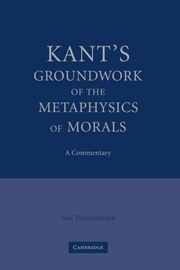Book contents
- Frontmatter
- Contents
- Acknowledgements
- Note on quotations from Kant's works
- Introduction
- Kant's Groundwork: synopsis of the argument
- Commentary
- Appendix A Schiller's scruples of conscience
- Appendix B The pervasiveness of morality
- Appendix C Universal legislation, ends and puzzle maxims
- Appendix D ‘Indirect duty’: Kantian consequentialism
- Appendix E Freedom and moral failure: Reinhold and Sidgwick
- Appendix F The project of a ‘metaphysics of morals’
- Glossary
- Bibliography
- Index
Appendix D - ‘Indirect duty’: Kantian consequentialism
Published online by Cambridge University Press: 24 February 2010
- Frontmatter
- Contents
- Acknowledgements
- Note on quotations from Kant's works
- Introduction
- Kant's Groundwork: synopsis of the argument
- Commentary
- Appendix A Schiller's scruples of conscience
- Appendix B The pervasiveness of morality
- Appendix C Universal legislation, ends and puzzle maxims
- Appendix D ‘Indirect duty’: Kantian consequentialism
- Appendix E Freedom and moral failure: Reinhold and Sidgwick
- Appendix F The project of a ‘metaphysics of morals’
- Glossary
- Bibliography
- Index
Summary
Kant was not, and could not have been, a consequentialist. In his ethical theory, moral interest is primarily directed at the action itself and not, like ‘pathological’ interest based on inclination, at the object that we intend to promote or effect. However, it is a mistake to conclude that Kant must dismiss consequences as ethically irrelevant or unimportant. They matter in two distinct ways. First, effects have their role to play in the thought experiment of applying the more formalist versions of the categorical imperative. Effects do not determine what ought to be done – that would be consequentialism – but they help us to discover whether we can think or will a proposed maxim as a universal law. For example, when I am tempted to make a false promise I need to reflect on the consequences of my attitude's being adopted by all humanity to realise that I cannot will (in fact even think) a deceitful maxim as a universal law. Consequentialist calculation thus helps me to make up my mind whether I may act in the way I desire. But it does not decide the question of whether my action is permissible. That depends on whether I would incur a practical contradiction were I to act on the universalised maxim. It is hardly surprising that consequences should enter the moral equation in this manner. After all, the first variant of the categorical imperative tells us to think of our maxims as universal – causal! – laws of nature.
- Type
- Chapter
- Information
- Kant's Groundwork of the Metaphysics of MoralsA Commentary, pp. 161 - 163Publisher: Cambridge University PressPrint publication year: 2007



